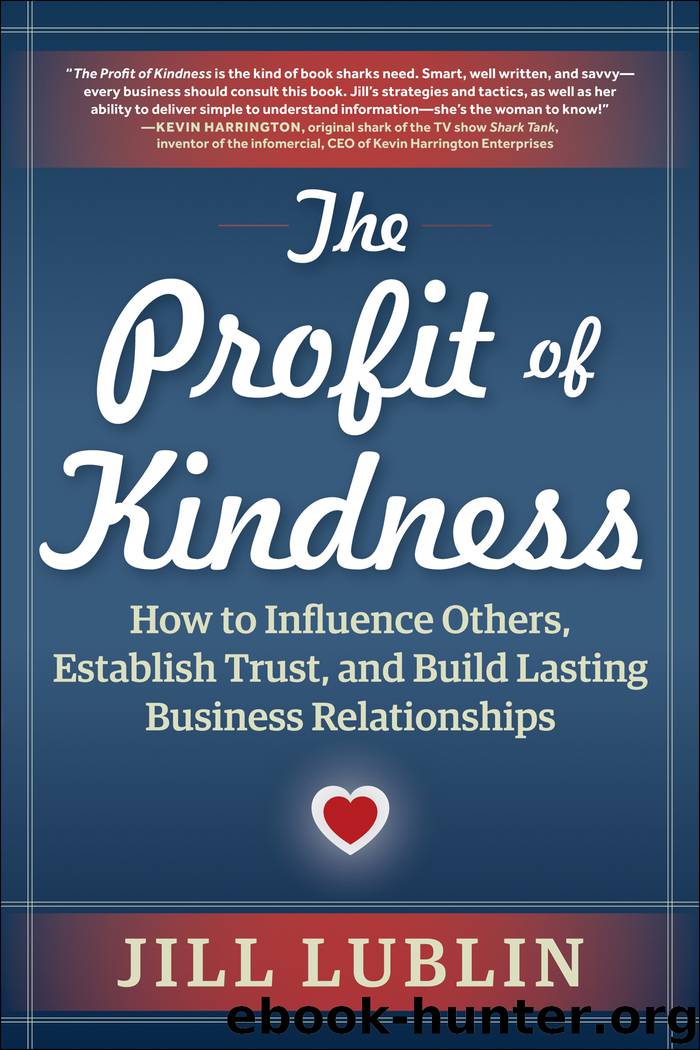The Profit of Kindness by Jill Lublin

Author:Jill Lublin
Language: eng
Format: epub
Publisher: Career Press
Published: 2017-01-27T05:00:00+00:00
Flexibility and Customers
We are all concerned about sustainability, but business owners are also heavily focused on the customer experience. What they need, when they shop, how they make purchasing decisions, and so much more, need to be accounted for when determining if we are providing good customer service. Researching and assessing these and other factors is nothing other than flexibility and adaptability in action.
“We owe it to our consumer to offer her various options for how she wants to shop; we shouldn’t impose rules on her,” Natalie Massenet, founder of Net-a-Porter, told Fast Company.1 And she should know, as her focus on flexibility earned her high-end online boutique $80 million in sales in one month alone. She engages in the same 365-day returns policy and free two-way shipping that Zappos, the online shoe retailer, is famous for.
Headlines abound about Zappos’s extremely flexible return policy, but the skeptics have been quieted since the store reported the more goods customers return, the better it is for business. “Our best customers have the highest returns rates,” Craig Adkins, VP of services and operations told Fast Company, “but they are also the ones that spend the most money with us and are our most profitable customers.”2 Zappos’s model is not to give its purchasers the cheapest footwear out there, but to give them the best service (a 365-day returns policy and free two-way shipping).
Being flexible means learning directly from the customer what needs changing or improving, which is why flexibility enforced by front-end employees is something worth considering. A well-known story about The Ritz-Carlton Hotel is a prime example of the power of flexibility being in the hands of those who deal with clients the most.
The president of The Ritz-Carlton, Horst Schulze, instinctively knew that people with complaints or requests do not want to hear “I will ask management,” so he created a policy that gave frontline employees autonomous decision-making power over their interactions with customers. By doing so, Schulze infused a true feeling of luxury, efficiency, and brand recognition, as customers’ problems were solved more immediately and personally.3 The flexibility of allowing staff to be flexible to clients, without adhering to rules that have been set as company guidelines and policies, makes customers feel heard and believe they are a part of an actual relationship, instead of being held hostage to corporate policy. Ask members of your staff what kinds of situations they encounter that go unsolved, and find out what tools would help them. Bending the rules can make a big difference, because doing so makes customers feel like they matter.
I recently experienced a similar situation. I was speaking in Las Vegas on Friday and Saturday. It wasn’t until midnight Friday that I checked into the hotel, as I had travelled in the morning by plane and went straight to the conference. It had been at least a 14-hour day with another long day ahead of me, so I couldn’t wait to hit the hay. At the reservations desk, the receptionist told
Download
This site does not store any files on its server. We only index and link to content provided by other sites. Please contact the content providers to delete copyright contents if any and email us, we'll remove relevant links or contents immediately.
Nudge - Improving Decisions about Health, Wealth, and Happiness by Thaler Sunstein(7706)
Deep Work by Cal Newport(7083)
Principles: Life and Work by Ray Dalio(6449)
The Doodle Revolution by Sunni Brown(4761)
Factfulness: Ten Reasons We're Wrong About the World – and Why Things Are Better Than You Think by Hans Rosling(4742)
Eat That Frog! by Brian Tracy(4540)
Thinking in Bets by Annie Duke(4227)
Hyperfocus by Chris Bailey(4118)
Visual Intelligence by Amy E. Herman(3782)
Writing Your Dissertation in Fifteen Minutes a Day by Joan Bolker(3729)
Ogilvy on Advertising by David Ogilvy(3622)
Hidden Persuasion: 33 psychological influence techniques in advertising by Marc Andrews & Matthijs van Leeuwen & Rick van Baaren(3565)
How to Win Friends and Influence People in the Digital Age by Dale Carnegie & Associates(3562)
How to win friends and influence people by Dale Carnegie(3474)
The Pixar Touch by David A. Price(3439)
Schaum's Quick Guide to Writing Great Short Stories by Margaret Lucke(3381)
Deep Work: Rules for Focused Success in a Distracted World by Cal Newport(3237)
Work Clean by Dan Charnas(3123)
The Slow Fix: Solve Problems, Work Smarter, and Live Better In a World Addicted to Speed by Carl Honore(3009)
